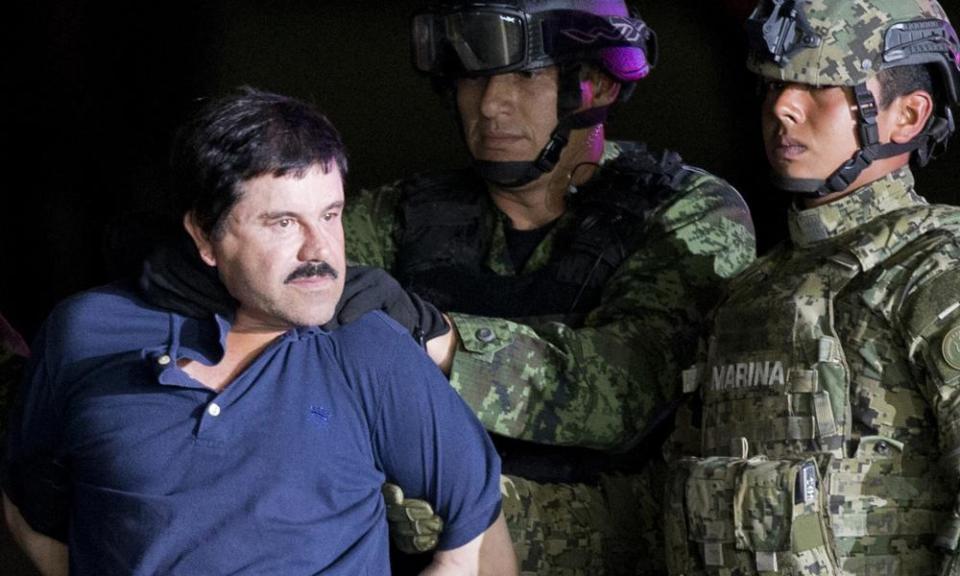Authorities haven't found 'even a dollar' of El Chapo's $1bn drug fortune
US authorities investigating jailed drug lord Joaquín ‘El Chapo’ Guzmán have still not been able to trace a single trace of his ill-gotten gains

Over nearly 30 years at the head of one of the most powerful crime organisations in the world, the jailed drug lord Joaquín “El Chapo” Guzmán is reputed to have built up a fortune worth at least $1bn.
But according to Mexico’s attorney general, US authorities investigating the kingpin have still not been able to trace a single dollar’s worth of Guzmán’s ill-gotten gains.
“As of today, US authorities have not found not even one dollar of El Chapo’s assets,” Raul Cervantes told the broadcaster Televisa on Wednesday. “His money hasn’t been found because he didn’t use the financial system.”
Guzmán, who entered the realms of criminal folklore by twice escaping maximum security prisons, was captured for the third time in January 2016 and extradited a year later to the US on the eve of Donald Trump’s inauguration. He faces a string of charges in a New York court and prosecutors are seeking the forfeiture of more than $14bn in illicit earnings made by his Sinaloa cartel.
Cervantes appeared on morning television to boast about the capture on Tuesday of Dámaso López, Guzmán’s former right-hand man who authorities say was trying to seize control of his old boss’s criminal empire.
But his comments on López were overshadowed by his candid admission that Guzmán’s millions have not been found.
The kingin’s fortune has been the subject of intense speculation over the past decade as Mexico launched an all-out war on organized crime in a crackdown which has cost an estimated 200,000 lives.
In 2009, Forbes magazine infuriated then president Felipe Calderón when it included Guzmán on its list of the world’s richest people, with an estimated net worth of $1bn. The magazine dropped him from the list in 2013, saying it couldn’t verify his net worth.
Last May, the US justice department filed criminal forfeiture papers announcing its intention to seek around $14bn in assets upon Guzmán’s conviction. The document did not name any assets, and said the sum was based on the Sinaloa cartel’s total sales in the US and Canada between 1989 and 2014.
More recently, Ted Cruz – the senator from Texas and former presidential candidate – introduced the “El CHAPO Act,” which use those $14bn to fund construction of Trump’s proposed border wall.
That proposal prompted indignation in Mexico, whose government has repeatedly denied that it will fund the wall.
“It’s a good distraction to stigmatize the Mexican people even more: if the Mexican government doesn’t want to pay fro the wall, then narcotics traffickers will pay,” said Adrián López, director of the Sinaloa newspaper Noroeste. “It’s good for media attention, but impossible to make happen.”
And some analysts suspect Guzmán – who once claimed “I’m just a farmer” – has held onto much less than the authorities allege.
“In all probability, El Chapo does not have $14bn. That figure is basically an invention without basis by US prosecutors” who “pulled the figure out of their sleeve,” wrote security analyst Alejandro Hope in the newspaper El Universal.
Guzmán is currently held in a high-security area of the Metropolitan correctional center in lower Manhattan, while his criminal empire is currently thought to be the subject of a bitter fight between López, his former bodyguard, and his two sons.
Iván Archivaldo Guzmán often posts pictures of luxury cars, exotic animals and fancy locales on social media sites and is known to speed through his hometown of Culiacán in a red Ferrari.
Culiacán, hub of the Sinaloa cartel’s activities, also boasts a series of luxury shops and high-end auto dealerships – including Jaguar and Hummer – seldom seen in provincial Mexican cities.
“There’s an unknown amount of drug money circulating that is noticed, but can’t be measured,” said Adrián López, director of the Sinaloa newspaper Noroeste. “Culiacán started having services and luxury products when it was still a relatively small city, with Lamborghinis in the streets as if it were Rodeo Drive.”

